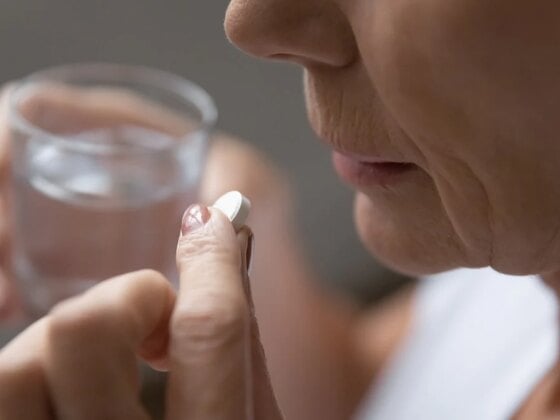It’s not hard to run across negative claims about the coronavirus vaccine. The wide reach of the internet has been especially effective in “super spreading” misinformation, but using some common sense can go a long way toward separating fact from fiction. Some vaccine myths are rooted in political or social points of view, while others indicate a lack of understanding about how the vaccines actually work. The personal health stakes are too high to let misconceptions and misinformation take hold, so let’s address a few of the myths we’ve come across so far.
MYTH: The COVID-19 vaccines will change a person’s DNA.
FACT: The vaccines do not change a person’s DNA.
This misinformation may start with the fact that the vaccines work at the cellular level to teach your body’s natural defense mechanisms to fight against the coronavirus. You’ve probably heard that the vaccines currently available (Pfizer and Moderna) are called mRNA types, which stands for messenger ribonucleicacid. When the mRNA vaccine is shot into your arm, picture it releasing a “messenger” delivering a recipe.
The cells in your body use this recipe to produce their own spike proteins – those protruding crowns sticking out of a coronavirus. The mRNA does not change human DNA, and the Pfizer and Moderna vaccines don’t even enter the cell nucleus, where its DNA is stored. And you won’t get sick with the coronavirus from these spikes because your body hasn’t created a whole coronavirus, just a small spike that’s formulated from an incomplete piece of the coronavirus genetic code. These harmless spikes nonetheless signal the body’s defense system to produce antibodies, which will be ready and able to kill the real coronavirus should your body encounter it.
Scientists did have to do some genetic decoding to make the vaccine, but it wasn’t human genetics they were after, but rather the structure of the coronavirus itself. Once scientists were able to decode the genetic structure of the tiny “spikes” found on the outside covering of the coronavirus, they had the key to creating a vaccine. Just this code – not a live or inactive coronavirus – is enough to trigger the body to create spikes of its own.
Some of the DNA-changing myths even claim the vaccine may partially change the gender of a person based on whether male or female cell lines were used to develop the vaccine. This is a far-fetched stretching of scientific reality. The University of Michigan’s healthblog outlined a theoretical scenario where mRNA could possibly alter human DNA, but that “the chances of this happening are extremely small. And even if it does, and the new DNA gets integrated into your existing DNA, the chances that this would cause negative consequences are even smaller.” The UofM healthblog goes on to describe that after the mRNA “message” is delivered, it breaks down, “like the secret agent messages in an old TV show that would say ‘this message will self-destruct in five minutes.’ ”
MYTH: COVID-19 vaccines contain microchip tracers, or a host of other objectionable elements ranging from fetal tissue, metals, or pork products.
FACT: Check out the ingredients list for the Pfizer and Moderna vaccines – you’ll find nothing of the sort.
Vaccine ingredients fall into four categories: fats (lipids), salt, sugar, and the mRNA (messenger ribonucleic acid). There is not a vaccine needle big enough to carry any of the nefarious materials alleged by these myths. More specifically:
- Microchips are sometimes attached outside a syringe to digitally scan information into your medical record. The microchip cannot track or control the individual.
- No fetal tissue or fetal cell lines are used in the production of the Pfizer or Moderna vaccines. HEK 293 fetal cell lines grown in a laboratory were used during the testing phase to assure these vaccines worked. HEK 293 fetal cell lines in use today for many types of scientific research are descended from a 1973 elective abortion, making them thousands of generations removed from the original fetal tissue. The Vatican News reported that its Congregation for the Doctrine of the Faith (CDF) found it “morally acceptable” to take these vaccines.
- No metals of any type are in the Pfizer or Moderna vaccines. The two vaccines currently in use don’t contain metals of any type, and this actually explains why they must be kept frozen and require two doses. Metals are sometimes used as a preservative or adjuvant, meaning a substance that helps the vaccine function better. The tiny amounts of aluminum or mercury used in other vaccines have been studied extensively. No credible scientific sources document harm from the trace amounts found in other vaccines.
- The Pfizer and Moderna vaccines are certified gelatin-free, meaning there is no concern for those abstaining from pork or other animal products, or those known to have allergic reactions to gelatin. Used as a stabilizer primarily against the effects of temperature, gelatin has been used in other vaccines and may be used in those yet to come to market.
MYTH: The vaccines cause infertility, erectile dysfunction, are harmful to pregnant individuals, those breastfeeding, or wanting to become pregnant.
FACT: Scientific research doesn’t back up any of these claims.
Because the vaccines teach the body’s natural defense mechanisms to fight the coronavirus, confusion has been sown about what else it might attack. Rumors saying that the vaccine was capable of attacking proteins involved in development of the placenta have no scientific backing. The vaccines are configured to do one thing only: teach cells to create spikes that will trigger the body’s production of anti-bodies against the coronavirus. The cells can’t interpret the mRNA in any other way because its genetic code is very specific. Confusion about this is “akin to mistaking a rhinoceros for a jaguar because they are wearing the same collar,” says immunologist Stephanie Langel about the infertility claim.
The CDC and the American College of Obstetricians and Gynecologists (ACOG) both recommend the vaccine not be withheld from pregnant and breastfeeding individuals. The CDC also points to data that pregnancy increases the risk of severe illness from COVID-19, while also acknowledging more study is needed on the vaccine’s affect on this population. Pregnant women were not included in clinical trials for the vaccine, though 23 trial participants became pregnant after being in the Pfizer clinical trial. Only one poor pregnancy outcome was reported, and that person was in the placebo group that did not receive the vaccine.
MYTH: The vaccine was rushed to market, so corners must have been cut somewhere.
FACT: mRNA research began with disease outbreaks that occurred long before COVID-19. Once a vaccine specific to COVID-19 was developed, its effectiveness was based on a statistically valid volume of data gathered from clinical trials.
Going back decades, past viral outbreaks such as SARS, MERS and Zika had already driven significant research and development toward an mRNA vaccine. The vaccine technology developed in response to these earlier outbreaks was designed on a “plug-and-play” platform so that, like dropping a new sim card into a cell phone, the mRNA would carry the specific genetic code of the virus currently rearing its ugly head. The vaccine technology existed, but as these earlier outbreaks fizzled, testing it through clinical trials became moot. COVID-19 changed that – with a vengeance.
The critical piece of information needed to target a specific virus is its genetic code, or genome. Discovering a genome used to take months or even years – something akin to finding a needle in a haystack. This is where modern technology greatly augmented the ability to model countless variations at lightning speed. Indeed the genetic code for COVID-19 was cracked in little more than one month after the first case was reported in Wuhan, China. The COVID-19 vaccine was rushed only in the sense that there was a desperate need for it, but the science behind it was developed over time and with intellectual vigor.
The COVID-19 vaccine was rushed only in the sense that there was a desperate need for it, but the science behind it was developed over time and with intellectual vigor.
The Phase 3 clinical trials for the COVID-19 vaccine were conducted with over 70,000 participants, and were concluded only when enough data was available for valid statistical analysis. Sadly, because COVID-19 was so effective at making people ill and die, data was not long in cumulating. Praise is also due for the all-hands-on-deck approach demonstrated between government and the vaccine makers. This once-in-a-century pandemic brought out our collective will to move mountains in service to the greater good.
MYTH: I’m better off taking my chances that I’ll survive COVID-19 rather than taking a vaccine.
FACT: Vaccines are our best shot at tamping down the number of cases and deaths attributable to COVID-19, and returning to some sense of normalcy.
Deciding to “take your chances” without the vaccine is a little like saying you’ll run every red light because you probably won’t get hit by a car. By taking the vaccine, you and those you care about, are much less likely to get sick or die. And the impact goes beyond you and your loved ones. When hospitals are at capacity with surging COVID-19 cases, the availability and quality of health care for everyone suffers. Hospital workers risk their lives to care for COVID-19 patients, and doing your best to lower COVID-19 risk is certainly owed them, not to mention assuring there will be enough of them when we need care.
Deciding to “take your chances” without the vaccine is a little like saying you’ll run every red light because you probably won’t get hit by a car.
The staggering number of COVID-19 deaths in the U.S. – 441,000 as of January 31st – is a tragedy of major proportions, and so too are the long-term effects of COVID-19 on its survivors. Brain fog, breathing problems, and joint pain are commonly reported, even among COVID-19 survivors who were never hospitalized, according to Jessica Dine, a pulmonary specialist at the University of Pennsylvania Perelman School of Medicine. Even if just a small percentage of the 23 million COVID-19 survivors experience these “long haul” effects, large numbers of people will experience prolonged suffering and again push our health care system to the brink of rationing or subpar care.
Some, especially those who have experienced discrimination and inferior access to health care over generations, have expressed hesitancy about taking the vaccine. These concerns are not based on myths – systemic racism in the U.S. has produced horrific tragedies such as the Tuskegee Study where African-American men were intentionally withheld syphilis treatment for 40 years beginning in 1932. Health disparities based on race and ethnicity continue to exist, with COVID-19 disproportionately affecting people of color. Earning the trust and confidence of those who have been failed by our health care system requires equitable access to care, and providing complete, understandable information so everyone can make the decision that is best for them.
Seek out facts
As distribution of COVID-19 vaccines start rolling out throughout the U.S., there will be new questions and concerns to grapple with. Trusted, reputable sources of information become all the more important. Seek them out. Here’s some basic advice:
- use trusted sources of information that use high standards for checking the facts;
- learn to spot statements of opinion masquerading as statements of facts;
- don’t share or spread information until you check it against trusted sources to make sure you’re not spreading misinformation.
Here are a few sources you can count on for reliable information:
- CDC Vaccine Safety Website
- Immunization Action Coalition – questions you should ask
- Medspeak – Medical jargon explained in plain English
- Michigan Department of Health and Human Services (MDHHS) Vaccine Safety Website
- University of California San Francisco – Evaluating Health Information



